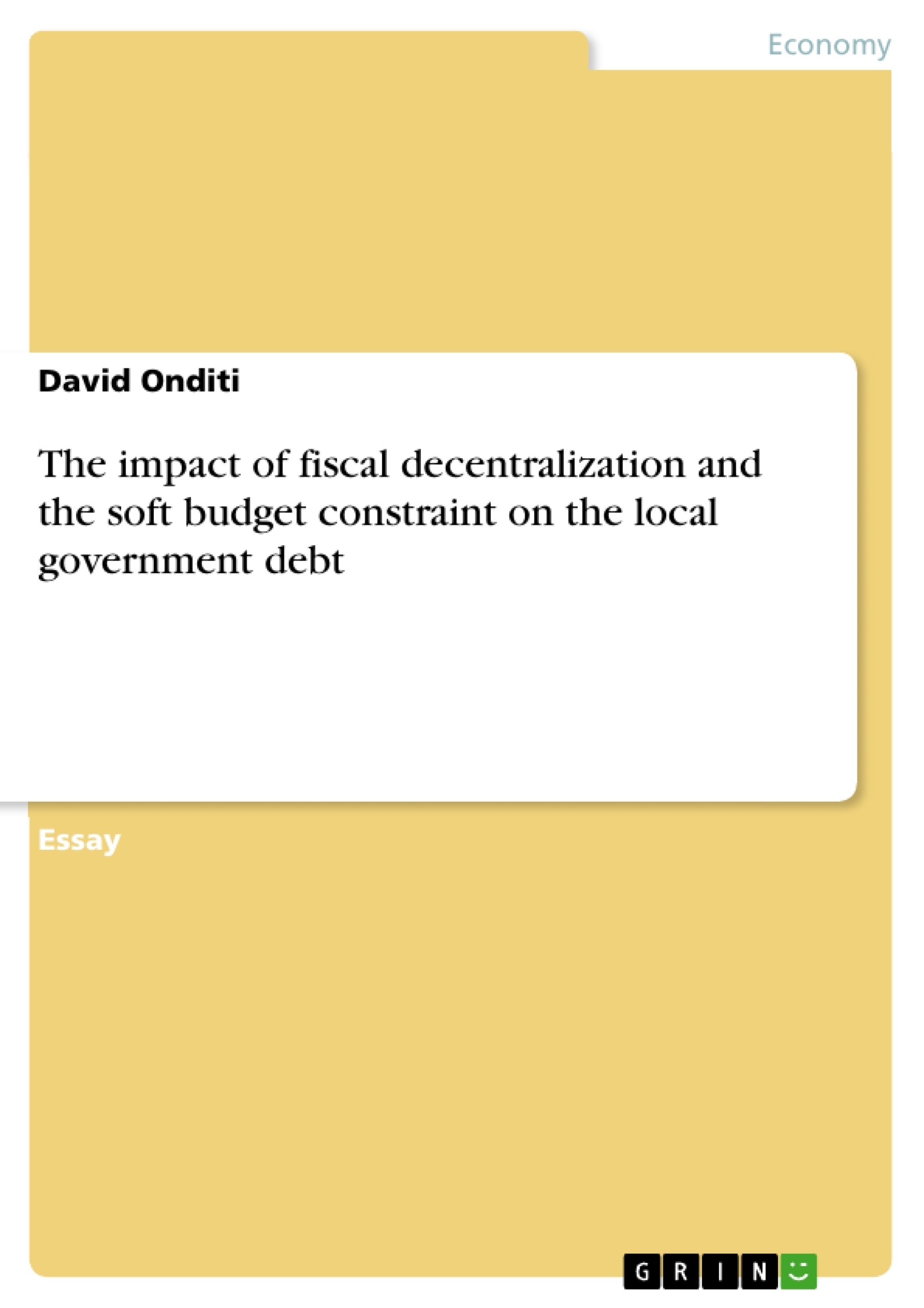The author aims to study the impacts of fiscal decentralization and soft budget constraint on the scale of local government debts. Moreover, the effect of soft budget constraint on the scale of local government debt under the different extent of fiscal decentralization will be discussed.
Due to the linkage between economic growth and the fiscal decentralization, the expansion in the local government debt is closely related to the fiscal decentralization and the soft budget constraint (SBC) – the expectation that the local governments would be bailed out by the central government if they face debt challenges.
Based on the literature fiscal decentralization is linked to local government debts as literature indicates that fiscal decentralization leads to the decentralization of the expenditure without the revenue collection powers. The Chinese local governments have increased expenditure budgets on public services but the powers of taxation are centralized. To bridge the revenue gaps, the local governments take up debts that are sunk into infrastructure and other low revenue generating investments. Soft budget constraints are thus a product of fiscal decentralization as they are based on the principal – agent relationship between the politicians and the voters, central government and local government and the local governments and the SOEs within the local jurisdictions.
Inhaltsverzeichnis (Table of Contents)
- Research Objective
- Literature review
- Definition of basic concepts
- Local government debt
- Fiscal decentralization
- Soft budget constraint
- The scale of local government debt
- Fiscal decentralization and the scale of local government debt
- Research Gaps
- Short statement listing other planned sections within the literature review chapter
- Methodology
- Variable definition
- Size of local government debt (DEBT)
- Financial decentralization indicators (FD)
- SBC
- Control variables
- Data sources
- Dynamic panel model
- Model setting
- Panel threshold model
- Model settings
- Settings for the model
- Model estimation method
- References
Zielsetzung und Themenschwerpunkte (Objectives and Key Themes)
This paper investigates the relationship between fiscal decentralization, soft budget constraint, and the scale of local government debt in China. The research aims to understand the impacts of both fiscal decentralization and soft budget constraint on the size of local government debt. Additionally, it seeks to examine how the effect of soft budget constraint on local government debt varies under different degrees of fiscal decentralization.
- Impact of fiscal decentralization on local government debt
- Impact of soft budget constraint on local government debt
- Relationship between fiscal decentralization and soft budget constraint
- Analysis of local government debt dynamics in China
- Policy implications for managing local government debt in decentralized economies
Zusammenfassung der Kapitel (Chapter Summaries)
- Chapter 1: Research Objective
This chapter lays out the central research question, which focuses on understanding the impacts of fiscal decentralization and soft budget constraint on the scale of local government debt in China. Two specific research hypotheses are presented: fiscal decentralization has a positive impact on local government debt, and soft budget constraint has a positive impact on local government debt. - Chapter 2: Literature review
This chapter provides a comprehensive overview of the existing literature related to the concepts of local government debt, fiscal decentralization, and soft budget constraint. It delves into the definitions of these key concepts and examines the theoretical frameworks that have been used to analyze the relationship between them. The chapter also explores the scale of local government debt in China and discusses how fiscal decentralization has influenced the growth of local government debt. - Chapter 3: Research Gaps
This chapter identifies the gaps in the current literature that the research will address. It highlights the need for further investigation into the specific relationship between fiscal decentralization, soft budget constraint, and local government debt in the Chinese context. - Chapter 4: Methodology
This chapter outlines the methodological approach that will be employed in the study. It includes a detailed explanation of the variables used, data sources, and the statistical models that will be used to analyze the data. The chapter focuses on the use of dynamic panel models and panel threshold models to examine the complex relationships between the key variables.
Schlüsselwörter (Keywords)
The key terms and focus topics of this work include: local government debt, fiscal decentralization, soft budget constraint, China, dynamic panel model, panel threshold model, economic growth, public services, and infrastructure investment.
Frequently Asked Questions
What is the focus of this research?
The research investigates how fiscal decentralization and soft budget constraints (SBC) impact the scale of local government debt, specifically in the context of China.
What does "soft budget constraint" (SBC) mean?
It refers to the expectation that local governments will be bailed out by the central government if they face financial difficulties, which encourages them to take on more debt.
How does fiscal decentralization lead to local debt?
In many cases, expenditure responsibilities are decentralized while revenue collection remains centralized. This creates a funding gap that local governments often fill by taking on debt for infrastructure and public services.
What models are used to analyze the data?
The study employs dynamic panel models and panel threshold models to examine the complex relationships and varying effects of decentralization on debt levels.
What are the hypotheses of the study?
The main hypotheses are that both fiscal decentralization and soft budget constraints have a positive (increasing) impact on the size of local government debt.
- Arbeit zitieren
- David Onditi (Autor:in), 2019, The impact of fiscal decentralization and the soft budget constraint on the local government debt, München, GRIN Verlag, https://www.grin.com/document/507966



